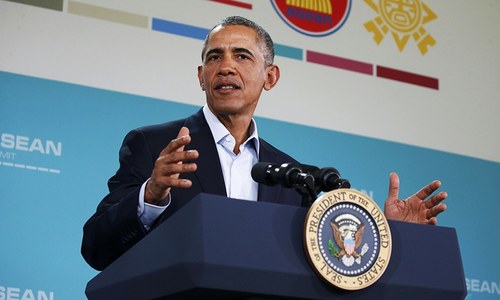WASHINGTON: US President Barack Obama, who completes his second and final term this year, acknowledges that he failed in persuading Muslims to examine the roots of their grievances.
In a long interview to the Atlantic magazine, published in its April issue, Mr Obama also emphasises the need for a modernist reform within Islam, which, he believes, would better equip Muslims for dealing with the problems they face now.
He said that in his “new beginning” speech in Egypt on June 4, 2009, he had shared a message of peace and hope with the Muslim masses.
“I was hoping that my speech could trigger a discussion, could create space for Muslims to address the real problems they are confronting — problems of governance,” he said.
He noted that ‘some currents” of Islam had not gone through a reformation that would help people adapt their religious doctrines to modernity.
“My thought was, I would communicate that the US is not standing in the way of this progress, that we would help, in whatever way possible, to advance the goals of a practical, successful Arab agenda that provided a better life for ordinary people,” he said.
Some analysts argue that Mr Obama’s Cairo speech did contribute to the Arab spring that toppled several totalitarian regimes in the region. But critics say that Mr Obama’s approach was ineffective and he did not understand the threat that some radical Muslim groups posed.
In his interview to the Atlantic, he said he had been urging Muslim leaders to do more to eliminate the threat of violent ‘fundamentalism’.
“It is very clear what I mean,” he said, “which is that there is a violent, radical, fanatical, nihilistic interpretation of Islam by a faction—a tiny faction — within the Muslim community that is our enemy, and that has to be defeated.”
Mr Obama said that there was also the need for Islam “as a whole to challenge that interpretation of Islam, to isolate it, and to undergo a vigorous discussion within their community about how Islam works as part of a peaceful, modern society”.
But this response to radical interpretations of Islam should come from within, as it cannot be enforced by outside powers.
“I do not persuade peaceful, tolerant Muslims to engage in that debate if I’m not sensitive to their concern that they are being tagged with a broad brush,” he said.
Mr Obama also believes that the intensified Muslim fury of recent years was encouraged by countries considered friends of the US, says the interviewer, Jeffrey Goldberg.
In a meeting with Malcolm Turnbull, the new prime minister of Australia, Mr Obama described how he had watched Indonesia gradually move from a relaxed, syncretistic Islam to a more fundamentalist, unforgiving interpretation.
When Mr Turnbull asked why this was happening, Mr Obama said the Saudis and other Gulf Arabs had funnelled money, and large numbers of imams and teachers, into the country.
“Aren’t the Saudis your friends?” Mr Turnbull asked. “It’s complicated,” Mr Obama replied.
The interviewer notes that Mr Obama’s patience with Saudi Arabia has always been limited. In his first foreign-policy commentary in 2002, Mr Obama advised the then president Bush to persuade the Saudis and Egyptians to “stop oppressing their own people, and suppressing dissent, and tolerating corruption and inequality”.
“In the White House these days, one occasionally hears Mr Obama’s National Security Council officials pointedly reminding visitors that the large majority of 9/11 hijackers were not Iranian, but Saudi,” Mr Goldberg wrote.
“And Obama himself rails against Saudi Arabia’s state-sanctioned misogyny, arguing in private that ‘a country cannot function in the modern world when it is repressing half of its population,’” he added.
Mr Goldberg said the president told him that the Saudis needed to “share” the Middle East with their Iranian foes.
“(We need to) say to our friends as well as to the Iranians that they need to find an effective way to share the neighbourhood and institute some sort of cold peace,” Mr Obama said.
According to the interviewer, Mr Obama also believed that one of the most destructive forces in the Middle East was tribalism, which reflected in the reversion to sect, creed, clan, and village by the desperate citizens of failing states.
Published in Dawn, March 16th, 2016














































